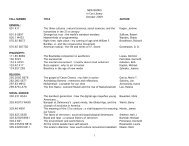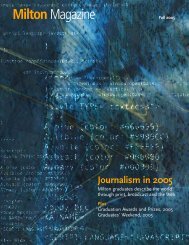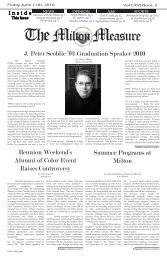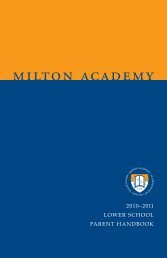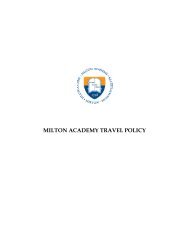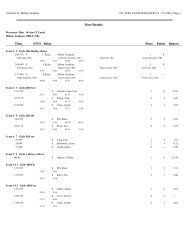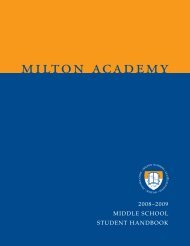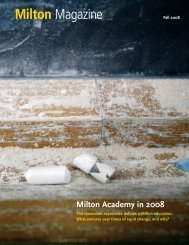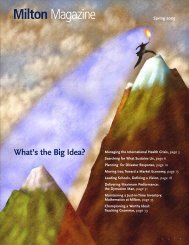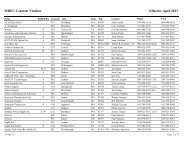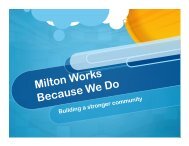Spring 2007 - Milton Academy
Spring 2007 - Milton Academy
Spring 2007 - Milton Academy
- No tags were found...
Create successful ePaper yourself
Turn your PDF publications into a flip-book with our unique Google optimized e-Paper software.
“I’ve sometimes thought that the period when I’m at mybest is when I know the least. That’s when you ask dumbquestions, but they’re often good questions, because you’renot inhibited by what you know.“I think lots of people underestimate the power of theirgeneric capacities; they shortchange their own native abilities,their intuition, their gut, their questions. I’ve said tothem, ‘Now hold on, vision doesn’t spring from a spreadsheet;analysis only gets you so far.’ You need judgment,good antennae—to know why something is important, whocares about making a change, and who cares about the statusquo. And you need to get into the shoes of other peoplewithout losing your own grounding. That’s not manipulative;it informs the process.“It’s too bad when the emphasis on higher degrees and specializationovershadows the importance of basic liberal arts.That process of how you grow at school is so mysterious—which inherent capacities you brought and which were cultivatedonce you got there.“I decided to leave government in 1990 (I’d been theresince 1960), to see how it would be in a less regulated environment.I thought about foundations, where you couldstand back, identify and seize opportunities to be thebridge, to fill the gap between an idea and its implementation.I realized that I am not fussy about subject matter—education, health care, another field—as long as it squareswith my values, is large in scope, and is important. Allalong, I found I thrived on new situations, new environments,new relationships, and on learning an entirelynew field.“My friend Peter Goldmark, who also worked with JohnLindsay and had led such large governmental organizationsas the welfare department in Massachusetts and the NewYork/New Jersey Port Authority, was then head of theRockefeller Foundation. Lots of people can’t see the widerapplicability of government experience or that the challengesare as tough as any in the private sector. It was fortunatethat he did, and that he invited me to help him inSouth Africa.“The foundation world enables important change but canbe pretty far removed from implementation. I have towatch out, because many times I’d rather be the grantee,making change happen, working where the tough andinteresting decisions have to be made.“I figured out when I was a child that the person who hadthe most influence in my father’s daily work was his secretary.I didn’t care about title. I wanted four things: to workwith strong people I respect, to be engaged with big ideas,to have influence, and to have fun. For my first job out ofcollege, I decided to work for a congressman rather than asenator, because the office would be smaller, and I’d beexposed to the whole thing. That began a pattern of workingwith the whole picture.”CDENelson Mandela, Sally Bowles ’56 and Oliver Tambo, African National Congress president at the time. London, 1990.11 <strong>Milton</strong> Magazine



